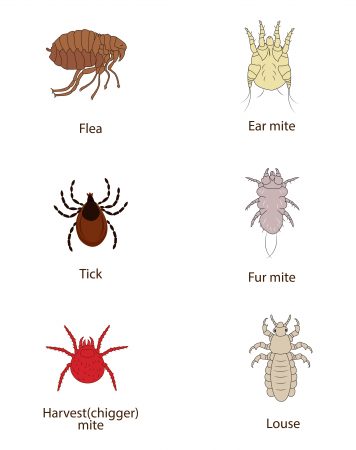For any pet owner, seeing your dog or cat in a state of itching is always troubling. Itching may be caused by a variety of things, such as mites, infection, or fleas. Does your cat or dog have itchy skin? If so, there is also a chance that he or she has allergic dermatitis – a skin condition that is typically associated with redness, itching, sores, and/or rashes – due to allergies or skin sensitivities from external agents (such as environmental, fleas or food-related).
Dogs and cats are not born with allergies, they develop over time. Dogs normally show signs of the disease between 6 months and 6 years of age. Signs of allergic dermatitis can be mild and seasonal at first but then get more severe and prolonged as time goes on. 
Despite the fact dogs are more prone to allergic dermatitis than cats, it does occur in felines too.
What are the signs to watch for?
Often symptoms associated with allergic dermatitis progressively worsen with time, though they become more apparent during certain seasons.
- Itchy skin
- Hair loss and/or skin damage due to scratching, biting and licking
- Fur at a lick site may turn pinkish
- Skin at the affected areas may appear red and/or thickened
- Strong odor, greasiness, red spots, pimples, scabs at the affected areas
- Ear discharge
- Head shaking
- Ear odor/infection
- Flea dirt in the coat
- Gastrointestinal issues can also be allergy related
What are the causes?
Early onset is often associated with a family history of skin allergies. Genetics may lead the dog to become more susceptible to allergens such as:
- Animal danders
- Airborne pollens (grasses, weeds, trees, etc.)
- Mold spores (indoor and outdoor)
- House dust mites
- Foods
If your pet exhibits these signs, you should contact your veterinarian for an appointment to determine the cause of the problem and to obtain treatment. Typically, veterinarians will examine allergy suspects for skin mites, staph infections and ringworm to rule out those causes. Then they will work to determine what the allergy may be. Once a diagnosis has been determined, your veterinarian may recommend one or more of the following:
- Check all animals in the home for fleas and if found, take steps to remove the flea infestation from your home.
- Antibiotics may be administered to treat secondary infections.
- Anti-itch medications may be prescribed.
- Food allergy patients will be prescribed a specialized hypoallergenic diet and must be restricted to that food.
- Regularly monitor your pet for continued or recurring skin or gastrointestinal signs.
- Some pets may require repeated bouts of therapy.
What can be done to control the itch caused by allergic dermatitis?
- Avoidance (removing allergens from the environment or changing environments altogether)
- Flea prevention- even if the pet has no fleas now, one flea bite can send an allergic pet into a frenzy of scratching and chewing itself. An ounce of prevention is worth a pound of cure!
- Fatty acid supplements:Omega-3 fatty acid supplements are no cure-all, but they help reduce skin inflammation and are often used in combination with other medications.
- Topical treatments:Medicated shampoos, leave-on conditioners, and ointments can do a lot to relieve a pet’s itching or help with secondary conditions such as fungal infections, bacterial infections, and scaling. Frequent bathing with an appropriate shampoo is helpful, but be sure to follow all label directions carefully. Avoid the use of human products on pets unless they are recommended by your veterinarian.
- Antihistamines: Drugs like diphenhydramine have few side effects compared with some other therapies, so they may be worth a try. However, most pets will not respond to antihistamines alone. Avoid giving human drugs to your pet unless directed to do so by your veterinarian.
- Prescription medications- Unfortunately, some pets’ atopic disease cannot be controlled by any of the above approaches and their quality of life may suffer drastically unless more intensive drug therapy is initiated:
Steroids: Drugs like prednisone or dexamethasone, which are called corticosteroids, are often used because they tend to be very effective and safe for short-term use. These medications can be given by injection, by mouth, or as topical ointments or shampoos. Corticosteroids can provide immediate relief but may have undesirable side effects, such as increased appetite, thirst, and urination. In some cases, repeated or long-term use of steroids can be associated with an increased risk of medical problems such as liver problems, adrenal gland problems, and diabetes.
Cyclosporine: Cyclosporine can be used to control allergic dermatitis in dogs but it is particularly useful in cats. The medication is given once a day for 4 weeks (4 to 6 weeks in cats, based on response). After that, the dose can sometimes be tapered to every other day or twice weekly, as needed to maintain effectiveness. Researchers estimate that about 70% of dogs and cats respond to this treatment; however, it can have side effects such as stomach upset and diarrhea. Ask your veterinarian if cyclosporine may be a good choice for your pet.
There are some great new medications for controlling allergies without the side effects of steroids and cyclosporine.
Cytopoint: Cytopoint is given by injection, once a month or sometimes less frequently. It is an antibody directed against a protein that sends the itch signal to the brain, blocking the itch cycle. Most dogs get relief within a day or two, and it lasts for a month or longer. For more information click https://www.zoetisus.com/products/dogs/cytopoint/index.aspx
Apoquel: Apoquel is a tablet that is given twice a day for two weeks, then once a day after that. It starts to work within 4 hours and is safe for long term use in dogs over 12 months of age. For more information click: https://www.zoetisus.com/products/dogs/apoquel/index.aspx
If your dog or cat is itching to the point of skin damage or hair loss, call us so we can you both of you some relief!
